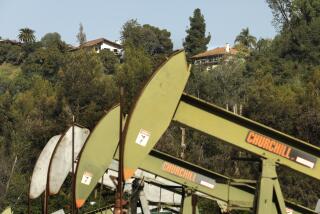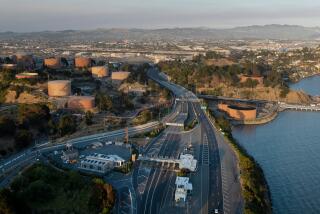Tapping California shale oil could add millions of jobs, study says
California’s Monterey shale, which holds an estimated 15 billion barrels of oil, has been touted as crucial to the state’s energy future and a boon to its economy. A study released Thursday tries to quantify the potential economic benefits.
The study by USC and the Communications Institute, a Los Angeles think tank, estimates that development of the 1,750-square-mile formation in central California could generate half a million new jobs by 2015 and 2.8 million by 2020.
Tapping the Monterey shale, which holds an estimated two-thirds of the country’s shale oil reserves, would probably require some combination of horizontal drilling and hydraulic fracturing, known as fracking, a practice opposed by many environmentalists worried about possible damage to land and water.
The environmental impacts must be studied, acknowledged USC professor Adam Rose, one of the study’s co-leaders. He said there are plans for additional reports to examine how developing the Monterey shale would affect water quality and seismic activity.
With the help of new technology, states such as North Dakota and Texas have unlocked similar large oil reserves embedded deep underground, spurring heady job growth. In North Dakota, for example, oil activity around its Bakken shale has contributed to an unemployment rate of 3.2%, the nation’s lowest.
“The Monterey shale would help stimulate the California economy to a significant extent,” Rose said. “It’s not just a benefit to the oil industry. These impacts ripple throughout the economy.” Oil workers, for example, send their paychecks back into the community by eating at restaurants and shopping in its stores.
The study forecasts that the state could reap oil-related tax revenue of $4.5 billion in 2015 and $24.6 billion by 2020.
Several organizations, including the Center for Biological Diversity and the Sierra Club, have sued the California Department of Conservation and Bureau of Land Management to push for more stringent regulations on fracking.
Other oil experts have expressed doubts about how big a boon the Monterey shale can be, arguing that California’s more varied geology and seismic activity would make the oil much more difficult to extract than in North Dakota’s Bakken.
Study co-leader Fred Aminzadeh, a USC research professor of engineering, said he’s confident that such technological hurdles can be overcome in the next three to five years. “We will start to see light at the end of the tunnel,” he said.
ALSO:
Executives doubt U.S. workers have the skills to succeed
Some banks are too big to prosecute, attorney general says
Gasoline is likely to stay at pennies per gallon in post-Chavez Venezuela
Follow Shan Li on Twitter @ShanLi
More to Read
Inside the business of entertainment
The Wide Shot brings you news, analysis and insights on everything from streaming wars to production — and what it all means for the future.
You may occasionally receive promotional content from the Los Angeles Times.










